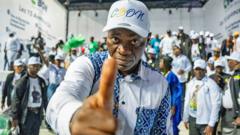Gabon is heading to the polls, marking a significant turn in its political journey following last year's coup that ousted Ali Bongo. Leading the charge is Brice Clotaire Oligui Nguema, who seeks to shift the nation towards a democratic future.
Evolving to Democracy: Gabon's Unique Political Transition

Evolving to Democracy: Gabon's Unique Political Transition
Gabon prepares for a pivotal election as military leader Brice Clotaire Oligui Nguema embraces democracy post-coup, a rarity amid Africa's military regimes.
In a contrasting narrative to several military coups across Africa, Gabon's political landscape is on the brink of transformation as citizens are set to vote for a new leader. Just over 19 months post-coup, Brice Clotaire Oligui Nguema, the architect of Gabon's peaceful military takeover, has traded his military attire for a politician's suit. As the overwhelmingly favored candidate in this Saturday's election, Nguema is expected to gain an outright majority against seven competitors.
With a campaign slogan, "C'BON"—a clever play on words meaning "it's good" in French—Nguema seems poised to continue garnering support from a populace eager for change after the dismissal of the Bongo family's long-standing rule. His handling of the transitional government has impressed many, as he has invited former political figures and civil society leaders into his administration while shunning the oppressive measures typical of regimes in West Africa.
In the wake of the military intervention that removed Ali Bongo amidst allegations of electoral fraud, Gabon has witnessed a remarkable shift. Where Bongo's last contentious victory left many skeptical, Nguema's ascent has sparked public relief and celebration. This change came after Bongo faced criticism over his health and the influence of his family during his tenure, which included a stroke that significantly affected his leadership.
The election promises not just a change of power but a chance for rapid development in Gabon—an oil-rich nation with vast natural resources and the second-largest exporter of manganese globally. The public now hopes for a leader who can fulfill the urgent demands for infrastructure and modernization, a role that Nguema has set himself to do without resorting to the autocratic tactics employed by military leaders in other parts of Africa.
Prominent figures from the previous government are contesting against him, yet his popularity may be insurmountable as he continues to foster public works and economic reforms. Although challenges remain including poverty and environmental management, the Gabonese people's anticipation for a democratic transition stands in stark contrast to the recent history of military-led governance seen in other African nations.
As the nation prepares to vote, Nguema's future leadership will be scrutinized, and he will bear the weight of expectations for an accountable and responsive government in the new era of Gabonese politics. For Nguema, the hard work of delivering progress now begins in earnest.
With a campaign slogan, "C'BON"—a clever play on words meaning "it's good" in French—Nguema seems poised to continue garnering support from a populace eager for change after the dismissal of the Bongo family's long-standing rule. His handling of the transitional government has impressed many, as he has invited former political figures and civil society leaders into his administration while shunning the oppressive measures typical of regimes in West Africa.
In the wake of the military intervention that removed Ali Bongo amidst allegations of electoral fraud, Gabon has witnessed a remarkable shift. Where Bongo's last contentious victory left many skeptical, Nguema's ascent has sparked public relief and celebration. This change came after Bongo faced criticism over his health and the influence of his family during his tenure, which included a stroke that significantly affected his leadership.
The election promises not just a change of power but a chance for rapid development in Gabon—an oil-rich nation with vast natural resources and the second-largest exporter of manganese globally. The public now hopes for a leader who can fulfill the urgent demands for infrastructure and modernization, a role that Nguema has set himself to do without resorting to the autocratic tactics employed by military leaders in other parts of Africa.
Prominent figures from the previous government are contesting against him, yet his popularity may be insurmountable as he continues to foster public works and economic reforms. Although challenges remain including poverty and environmental management, the Gabonese people's anticipation for a democratic transition stands in stark contrast to the recent history of military-led governance seen in other African nations.
As the nation prepares to vote, Nguema's future leadership will be scrutinized, and he will bear the weight of expectations for an accountable and responsive government in the new era of Gabonese politics. For Nguema, the hard work of delivering progress now begins in earnest.






















